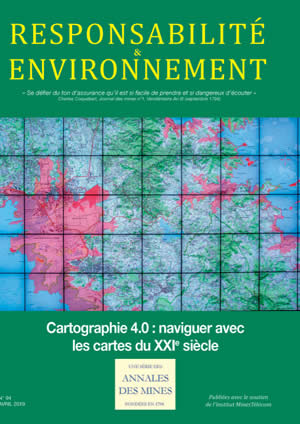|
 N° 94 - Avril 2019 - Cartographie 4.0 : naviguer avec les cartes du XXIe siècle N° 94 - Avril 2019 - Cartographie 4.0 : naviguer avec les cartes du XXIe siècle
Why Standards Matter – The objectives and roadmap of the International Open Geospatial Consortium (OGC)
By Mark REICHARDT
Open Geospatial Consortium (OGC)
and
François ROBIDA
BRGM
The vision and mission of the Open Geospatial Consortium is discussed, with emphasis on its role to bring the power of location to decision makers around the world. OGC standards have significantly improved location information sharing worldwide and enable rapid integration of location data and technologies used in traditional mapping. OGC’s focus now is to improve decision making through the efficient application of location to a range of social, economic and environmental topics. OGC standards facilitate the rapid mobilization of new data sources (e.g. commercial imagery, LIDAR) and new and disruptive technologies (e.g. IoT, autonomous and unmanned systems) to address challenges related to climate change, water resource availability, urban planning and management, insurance risk assessment, public safety, alternative energy placement, and land administration to name a few.
 Télécharger gratuitement l'article Télécharger gratuitement l'article
 Retour au sommaire Retour au sommaire
 N° 94 - April 2019 - Cartography 4.0: Maps for navigation in the 21st century N° 94 - April 2019 - Cartography 4.0: Maps for navigation in the 21st century
Why Standards Matter ‒ The objectives and roadmap of the International Open Geospatial Consortium (OGC)
Mark Reichardt,
Open Geospatial Consortium (OGC),
and
François Robida,
BRGM
The vision and mission of the Open Geospatial Consortium is discussed, with emphasis on its role to bring the power of location to decision makers around the world. OGC standards have significantly improved location information sharing worldwide and enable rapid integration of location data and technologies used in traditional mapping. OGC’s focus now is to improve decision making through the efficient application of location to a range of social, economic and environmental topics. OGC standards facilitate the rapid mobilization of new data sources (e.g. commercial imagery, Lidar) and new and disruptive technologies (e.g. IoT, autonomous and unmanned systems) to address challenges related to climate change, water resource availability, urban planning and management, insurance risk assessment, public safety, alternative energy placement, and land administration to name a few.
 Retour au sommaire Retour au sommaire
|




